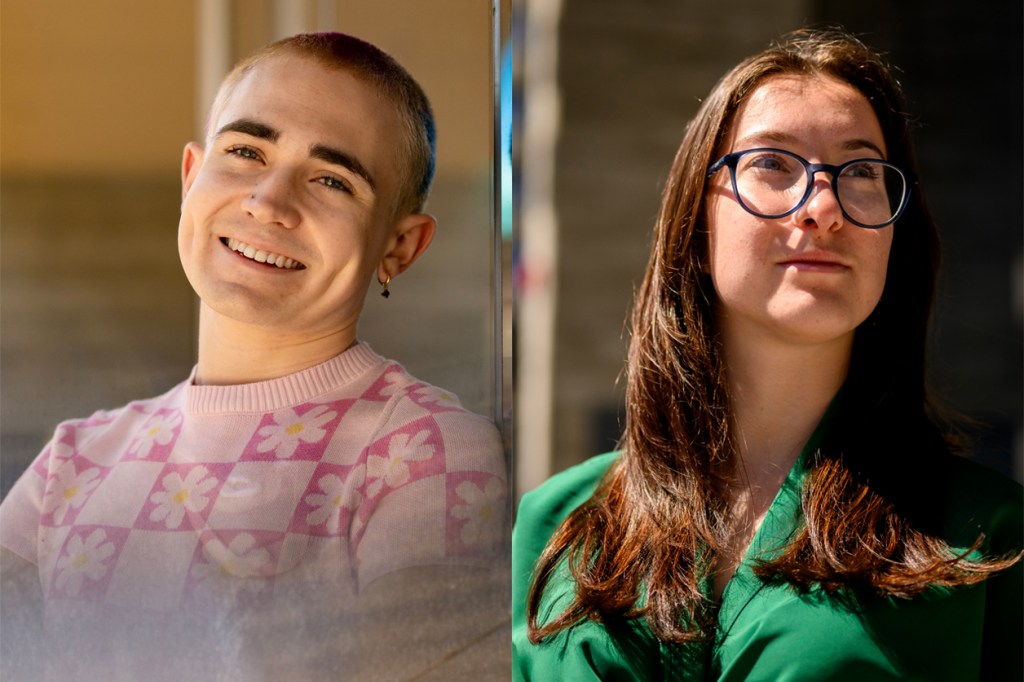Expanded mental health and wellness programs launched at Northeastern with help of student leaders

For Northeastern student Federica Ciummo, it all comes back to wellness.
“Wellness to me is everything,” says Ciummo, the first director of wellness for the university’s Student Government Association. “It’s so all encompassing — wellness fits into this, it fits into that.”
But Ciummo says that many of her peers are unaware of the vast resources for wellness, and particularly mental health, that are available to Northeastern students.
“Northeastern has a lot of resources when it comes to wellness,” Ciummo says. “However, it felt like students didn’t know how to access them, or where to go for their specific needs because sometimes they felt overwhelmed by the quantity of resources.”
So Ciummo and students including Matty Coleman decided to do something about it — convening a holistic wellness group with representatives of health and student groups on campus along with members of the university’s administration to coordinate the mental health needs of the students.
“There wasn’t really a forum that was super accessible and well known for people to directly convey concerns to wellness staff about the way that wellness was done at Northeastern,” Coleman says. “So we kind of thought, “OK, let’s fill that gap.”
Their efforts have paid off.
“Taking their feedback, we were able to move forward with and make some changes,” says Christine Civiletto, assistant vice chancellor of wellness and a mental health clinician who meets monthly with the group. “They’ve been great partners in thinking about not only what we need for services, but also partners in thinking about how to best get the messaging out to make sure that students know these services are available.”
And in this season of final exams and projects, graduation, new co-op or traveling experiences, these services can be particularly helpful.
Mental Health services for students
In October 2019, University Health and Counseling Services developed and implemented Find@Northeastern, where full-time students across the global university system have access to a variety of free and confidential mental health services. These include 24/7 support; unlimited free counseling sessions with a local clinician; and self-guided wellness programs including Headspace, a mindfulness app, and SilverCloud, a mental health app.
Back to School
But Ciummo and Civiletto both mentioned that some students had difficulty navigating the system and finding a local counselor, as the process required multiple steps.
To address these concerns and improve the offerings, the university recently transitioned the provider network for Find@Northeastern to Uwill, a leading mental health and wellness service.
Services now include enhanced 24/7 support to students across the global university system with clinicians specializing in crisis and trauma; unlimited free virtual counseling visits with a more diverse pool of clinicians than was previously available; immediate online referrals and scheduling; and continued access to Headspace and other wellness programs.
New this semester, students can quickly access appointments for unlimited free counseling by directly visiting Uwill’s website. There is no need for a student to wait for a referral to a therapist in the community from the 24/7 clinician or reach out to another site to schedule — that’s all done online.
In addition, the university recently launched Togetherall. This safe, online peer-to-peer mental health community allows students to give and receive support for mental health challenges anonymously and easily. It is monitored and moderated 24/7 by licensed clinicians and is currently available to all Northeastern students.
The University Health and Counseling Services on-campus clinic on the Boston campus has also expanded its services. Daily drop-in mental health hours are held Monday through Friday from 11 a.m. to 2 p.m. and Tuesday and Thursday evenings from 5 to 7:30 p.m. These enable students to quickly access mental health support — without a scheduled appointment — with a mental health clinician who can provide a brief assessment, offer support and intervention, and make recommendations and connections to ongoing care.
Counseling and Psychological Services (CAPS) in the Cowell Building on the Oakland campus also offers mental health appointments and urgent drop-in appointments Mondays through Fridays from 9 a.m. to 5 p.m.
The university has also published mental health guides for students, faculty, staff and parents and families affiliated with the Boston campus; students and employees of the global university system; and students, employees and families affiliated with the Oakland campus. These guidebooks include information about everything from warning signs of mental health trouble, to campus resources and common questions about therapy.
Northeastern is also part of the JED Campus program, a nationwide initiative of The Jed Foundation designed to help schools evaluate and strengthen their mental health, substance use and suicide prevention programs and systems.
Coleman says that diversity is crucial to the working group.
“I think a fairly well-known thing about mental health and wellness in general is that there’s a lot of stigma underscoring trying to access it, and that becomes a barrier for a lot of people,” he says. “Depending on the circles you run in and your personal history, your family history, the culture that you were brought up in, etc. the degree to which that is a barrier is going to vary. And if we don’t represent those adequately in a board with university wellness staff, we’re not really adequately representing the actual wellness concerns in the university community.”
And although they both graduate in May, Ciummo and Coleman are sure their efforts — and the efforts of their fellow Northeastern community members — will continue.
“I’m really excited for the future,” Ciummo says. “We accomplished a lot this year.”









